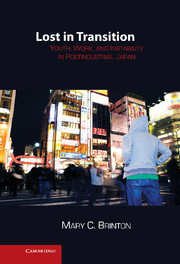Book contents
- Frontmatter
- Contents
- Figures
- Tables
- Preface
- Acknowledgments
- Lost in Transition
- 1 The Lost Generation
- 2 The Historical Roots of Japanese School-Work Institutions
- 3 The Importance of Ba, the Erosion of Ba
- 4 Unraveling School-Employer Relationships
- 5 Networks of Advantage and Disadvantage for New Graduates
- 6 Narratives of the New Mobility
- 7 The Future of the Lost Generation
- References
- Index
4 - Unraveling School-Employer Relationships
Published online by Cambridge University Press: 05 June 2012
- Frontmatter
- Contents
- Figures
- Tables
- Preface
- Acknowledgments
- Lost in Transition
- 1 The Lost Generation
- 2 The Historical Roots of Japanese School-Work Institutions
- 3 The Importance of Ba, the Erosion of Ba
- 4 Unraveling School-Employer Relationships
- 5 Networks of Advantage and Disadvantage for New Graduates
- 6 Narratives of the New Mobility
- 7 The Future of the Lost Generation
- References
- Index
Summary
“Ultimately, our graduates’ job search relies entirely on the school’s relationship with employers.”
– Guidance counselor at a general high school in YokohamaLooking only at the behavior of Japan’s young nonelite youth – those who are in low-ranking high schools – it can be easy to label them as rebellious and lacking in seriousness about their future. The attachment to school, club activities, and sports that used to bind many Japanese adolescents to their schools has declined. In its place is a preoccupation with part-time jobs – jobs that until recently were uniformly discouraged or even prohibited by school authorities. But are nonelite youth rejecting a system that is functioning as well as it used to? How well has the high school-work system weathered the economic conditions of the past decade and a half?
Japan’s high school-work system was rooted in the macro-level conditions of the high-economic growth period. These conditions unraveled to a large extent in the 1990s. Together with this unraveling, the effectiveness of the system has seriously declined. This, in turn, has made the transition from high school into full-time work harder for the lost generation. While institutional social capital and the school-work system have not collapsed completely, this chapter will suggest that the system seems to remain healthy only for certain types of high schools and employers. The majority of Japanese adolescents are in high schools that no longer maintain many recruitment ties with employers. Because of this, these adolescents have lost access to the time-honored direct route into full-time jobs that their parents had.
- Type
- Chapter
- Information
- Lost in TransitionYouth, Work, and Instability in Postindustrial Japan, pp. 98 - 118Publisher: Cambridge University PressPrint publication year: 2010



